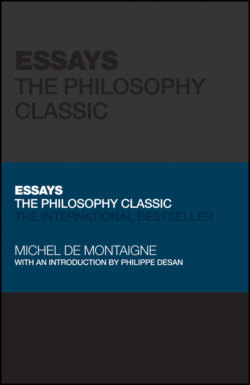Читать книгу Essays - Michel de Montaigne - Страница 18
BIRTH OF THE MODERN, SKEPTICAL SELF
ОглавлениеThroughout the Essays, freedom of personal judgment is privileged over society and education; the subject can always understand the world by himself and for himself. This self-sufficiency of the individual, out of its historical reality, also represents a trap for many modern readers of the Essays. In fact, one finds few references to possible political actions in Montaigne's writings; the accent is almost always placed on commenting on the world rather than changing it. Montaigne's trademark is the moment of introspection, withdrawal, and self-sufficiency.
The possibility of a theoretical truth of the world unconsciously conforms with our own bourgeois mentality, precisely because it isolates the subject from its immediate social and political environment. It is true that Montaigne offers a foundation for the liberal ideology that will soon assert itself from the eighteenth century on. Montaigne's doubts and questions about authority (leading to independence of thought and eventually liberty), and the confidence in his own judgment, have been associated with the birth of modern liberalism. A modern self emerges that is distanced from the authorities of the past, enjoying the victory of private judgment over institutions that limit individual freedom. However, this type of ideological appropriation often ignores the biography of Montaigne. He was not a political thinker, and the Essays were conceived in a specific political, religious, and social context.
Other critics have seen in Montaigne an adept of skepticism, but they seem to forget that one is not born a sceptic, one becomes one. Skepticism is not a philosophical choice for Montaigne; it is anchored in the reality of his time and resulted from a slow deterioration in moral values during the second half of the sixteenth century. With Montaigne, it is difficult to speak of skepticism in the singular – as the mere expression of the philosophical doctrine of this name. One should rather speak of “skeptical moments” in the plural. These moments were produced by personal experiences which were first and foremost of a political nature before becoming, eventually, a modus operandi. Indeed, it is difficult not to link philosophy and political experiences in Montaigne's work.
We have thus often confused a philosophical system – Skepticism – with what, in Montaigne's Essays, is essentially an inclination or a posture of the mind in the face of specific negative or dangerous political situations. The Essays are strewn with skeptical conclusions and impressions that are the result of Montaigne and his estate being in the middle of an atmosphere of unrest and terror. Shocked by the events he lived through – from the Saint-Bartholomew's Day massacre in 1572 to the assassination of Henry III in 1588 – it is very difficult to regroup his conflicting reactions and attitudes into a doctrine. One thing is certain: the religious situation of France between 1563 (beginning of the religious wars) and 1592 profoundly influenced the writing of Montaigne's book and nourished his skepticism.
